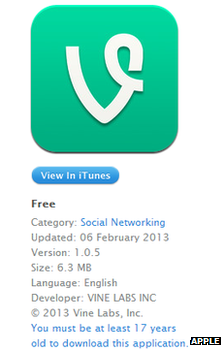Twitter's Vine app gets adult rating on Apple store
- Published

Apple's App Store now warns under-17s not to download Vine
Vine - Twitter's new video clip sharing app - has had its age rating increased to 17+ on Apple's store, the highest option.
The software had previously been rated suitable for 12-year-olds.
It follows complaints that some of its six-second segments were pornographic.
Blogging service Tumblr and photo-sharing service 500px have also seen their iPhone and iPad apps boosted to the maximum age rating over the past fortnight.
Vine is not yet available for Android, but Google Play rates its 500px app as having a "high maturity" content rating, while Tumblr is marked as "low maturity".
Technology news site The Verge was first to note the change in Vine's status, external.
The app had previously made headlines after one of its Editor's Pick showed a couple engaged in a sexual act.
Shortly after the clip's selection it entered the app's "popular now" list, signalling it was one of the product's most viewed videos. Twitter later apologised, blaming "human error".
It has also deleted some of the offending accounts, but Vine does not vet material before it goes online.
The incident came a week after Apple had blocked 500px's app from its marketplace "for featuring pornographic images and material, a clear violation of our guidelines".
It returned to the store a few days later after adding an in-app button to let users alert the service to inappropriate pictures.
Child safety
Developers must fill out a checklist alerting Apple to any issues with their software before it issues a rating and makes their software live.
Its guidelines state that apps qualify for its highest rating if they involve "sexual content, nudity, alcohol, tobacco and drugs".
Apple tells its customers they must not download an app if they fall below the stated age limit - but users can click away the warning message.

500px's app was briefly banned from Apple's iOS store
In Android's case developers rate their own software, external, although the firm reserves the right to change their suggestion.
Google's guidelines state that apps which "focus on suggestive or sexual references must be rated high maturity", but again it does not prevent under-18s from installing any app.
The National Society for the Prevention of Cruelty to Children (NSPCC) said the issue highlighted parents' responsibility to check how smartphones were being used.
"The internet and mobile phones are now part and parcel of young people's everyday lives," said Claire Lilley, safer technology lead at the NSPCC.
"The benefits are huge, both socially and educationally, but so too are the dangers.
"We cannot put the genie back in the bottle, but we can talk to our children about this issue. Parents, schools, technology companies, and young people themselves can all play their part."
- Published31 January 2013
- Published28 January 2013
- Published23 January 2013